

Air pollution more deadly in Africa than malnutrition or dirty water, study warns. Africa’s air pollution is causing more premature deaths than unsafe water or childhood malnutrition, and could develop into a health and climate crisis reminiscent of those seen in China and India, a study by a global policy forum has found.

Article: Cancer control in developing countries: using health data and health services research to measure and improve access, quality and efficiency. Describing Quality of Cancer Control in Developing Countries We consider the four principal approaches of cancer control to be cancer prevention, early detection, diagnosis/treatment and palliation, as described by the World Health Organization [5].
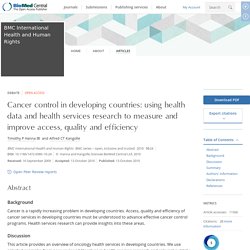
We will describe what is known about the quality of oncology services for cancer control in developing countries in terms of Donabedian's framework [6]. Donabedian describes quality assessment in terms of structure, process and outcome [6]. Structure refers to the attributes of the setting where care is delivered. This includes material resources, human resources and organizational structure. Structure of Oncology Services in Developing Countries There is a limited but growing body of literature describing the current status of cancer treatment resources, particularly for radiation therapy, in developing countries. Narcotics such as morphine are irreplaceable for controlling severe pain from cancer and other serious medical conditions. Austerity and inequality fuelling mental illness, says top UN envoy. Austerity, inequality and job insecurity are bad for mental health and governments should counteract them if they want to face up to the rising prevalence of mental illness, the UN’s top health envoy has said.
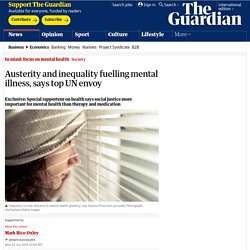
In an exclusive interview with the Guardian to coincide with a hard-hitting report to be delivered to the UN in Geneva on Monday, Dr Dainius Pūras said measures to address inequality and discrimination would be far more effective in combatting mental illness than the emphasis over the past 30 years on medication and therapy. “This would be the best ‘vaccine’ against mental illness and would be much better than the excessive use of psychotropic medication which is happening,” said Pūras, who as the UN’s special rapporteur on health reports back to the UN human rights council in Geneva. Book chapter: Neurological Disorders - Disease and Mortality in Sub-Saharan Africa - NCBI Bookshelf. Burning Opportunity: clean household energy for health, sustainable development and the wellbeing of women and children. Can a cleaner cookstove save lives? JUDY WOODRUFF: Nearly half of the world’s population, three billion people, cook using stoves that burn wood or charcoal.

That seemingly harmless act is silently killing millions every year because of regular exposure to harmful smoke. An international alliance is on a mission now to reduce those deaths by distributing 100 million cleaner stoves around the world. But some health experts doubt whether those new stoves can truly save lives. As Hari Sreenivasan reports in a story produced with Global Health Frontiers, researchers in Ghana are trying to find the answer.
DR. Equity and Noncommunicable Disease Reduction under the Sustainable Development Goals.
This article explores the trade-offs between cost-effectiveness and reducing health inequities. Focusing on the SDG target of reducing premature mortality from NCDs, the authors argue that reducing health inequities should be prioritised over maximising cost-effectiveness and that this is complex, requiring additional guidance. – mcquillan_ruth
Four million UK children too poor to have a healthy diet, study finds. Almost 4 million children in the UK live in households that would struggle to afford to buy enough fruit, vegetables, fish and other healthy foods to meet the official nutrition guidelines, a groundbreaking food poverty study reveals.
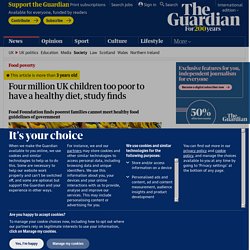
The research, by the Food Foundation thinktank, says the diminishing ability of low-income families to pay for healthy food is consigning the least well-off to a greater risk of diet related illness, such as obesity and diabetes, as well as widening health inequalities across society. Grimsby named unhealthiest high street in UK by RSPH study. Most depressed English communities 'in north and Midlands'
Poor people are allowed to be fat – video. Report: Household energy, indoor air pollution and health. Review: Adapting chronic care models for diabetes care delivery in low-and-middle-income countries: A review. Copyright©The Author(s) 2015.
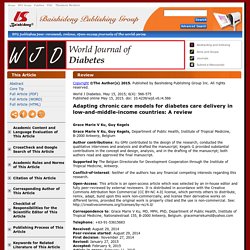
Adapting chronic care models for diabetes care delivery in low-and-middle-income countries: A review Grace Marie V Ku, Guy Kegels Grace Marie V Ku, Guy Kegels, Department of Public Health, Institute of Tropical Medicine, B-2000 Antwerp, Belgium Author contributions: Ku GMV contributed to the design of the research, conducted the qualitative interviews and analysis and drafted the manuscript; Kegels G provided substantial contributions in the concept and design, analysis, and in the drafting of the manuscript; both authors read and approved the final manuscript. Study dispels myth of links between poverty and weight. Call it the “Benefits Street effect” – the popularity of widely held preconceptions about unemployed people.
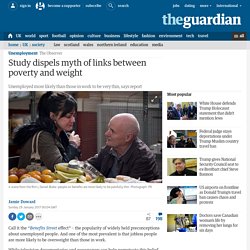
And one of the most prevalent is that jobless people are more likely to be overweight than those in work. While television documentaries and newspapers can help perpetuate this belief, academic studies also reinforce it. A series of studies have suggested that employers are biased against larger candidates when hiring staff. As a result, slimmer people tend to be employed first, leaving the overweight in the pool of the unemployed for longer. But a study in the journal Preventive Medicine produces evidence that unemployed people are far more likely to be significantly underweight than the average person. Systematic review: Improved stove interventions to reduce household air pollution in low and middle income countries: a descriptive systematic review. Our systematic review identified 5243 potential articles.
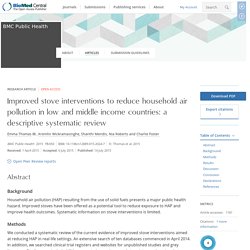
After duplicates were removed, title screening occurred on 3772 studies of which 258 were further screened on abstract and 57 full texts retrieved. The bad news is we’re dying early in Britain – and it’s all down to ‘shit-life syndrome’ The big problem with one of the most popular assumptions about the poor. In the late 1960s, Walter Mischel, a researcher at Stanford University, invited several hundred children to participate in a game in which they were given a choice: They could eat one sweet right away, or wait and have two a little later.

Initially, the goal was simple: to see how and why people (kids in this case) delayed gratification. But after the end of the experiment, Mischel began to check in with as many of the participants' families as he could, and over the following decade he learned that his little experiment probably had much larger implications than he had anticipated. Many of the children had trouble resisting the single, immediate treat (a marshmallow), which was to be expected. The magnetic force that exists between kids and candies is no secret. The mysteries of type 2 diabetes in developing countries. Unemployment, underweight, and obesity: Findings from Understanding Society (UKHLS) - ClinicalKey. Abstract Elevated morbidity and mortality among jobseekers may be partly explained by adiposity, but previous studies of unemployment and body mass index (BMI), which have usually modelled associations as linear, have produced inconsistent results.
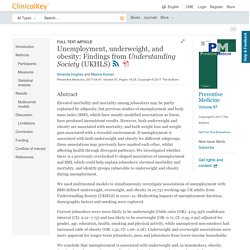
However, both underweight and obesity are associated with mortality, and both weight loss and weight gain associated with a stressful environment. Universal credit is a shambles because the poor are ignored. Poverty is a disease that silences its victims. It is impossible to imagine a government or institution designing a programme to combat racism without listening to members of ethnic minorities or a new road without consulting the home and business owners it would disturb. The poor, however, never have a say. Society infantilises them. We're all getting fat. There are lots of theories about what's causing the epidemic of obesity in America. Already, two in three Americans are overweight or obese. If current trends continue, some people believe a majority of Americans will be obese in another decade or so. A few years ago we teamed up to crunch the data looking for possible policy solutions. We used national studies and government databases to search for ways to combat the epidemic.
To do that we needed to look for evidence of what was driving Americans’ weight gain. Along the way, we found out that the data don't support many of the popular theories about what's causing obesity to increase so dramatically. Yogesh Jain: Lean diabetes in rural poor populations—management of this subset of patients needs rethinking – The BMJ. In the impoverished community in rural central India where my colleagues and I run a comprehensive primary health care programme, half of the population live below the poverty line [spend less than USD 0.5 per day] and undernutrition is rampant (median Body Mass Index 18.9 in men and 18.4 in women).